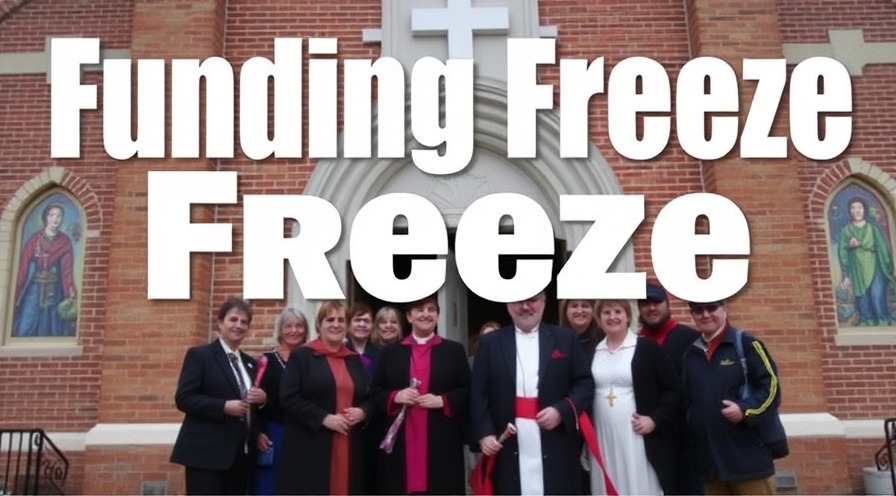
Refugee Resettlement in Charlotte Faces Unprecedented Challenges
In a significant move that has sent shockwaves through the refugee community in Charlotte, the Trump administration took steps to eliminate a federal program responsible for helping over 15,000 legal refugees resettle in the area. This decision, rooted in a promise to crack down on immigration, comes as part of an executive order that halted a long-standing government contract worth approximately $1.5 million. The reverberations of this change are being felt by many organizations that provide essential support to refugees, leaving them scrambling to address the needs of those affected.
In 'Charlotte refugee resettlement hit as funding freezes by Trump order,' the discussion dives into the current state of refugee support, prompting us to explore its implications further.
Community Support Systems Strained by Policy Changes
Organizations such as Catholic Charities are stepping up in the face of this unprecedented funding freeze. Their resilience is commendable, as they have vowed to ensure every refugee currently resettled in the area receives the support they need. However, concerns are mounting for not only those already here but also for families waiting anxiously for their turn to flee persecution. Refugees like Mark Koop, who escaped political and religious persecution nearly 20 years ago, highlight the human cost associated with these policy changes. While he has built a new life in Charlotte, his heart aches for those still trapped in dire situations back in Myanmar.
The Reality For Many Refugees
Koop's story is just one of many. Families escaping war and persecution often rely heavily on the services provided by Catholic Charities. From assistance with basic necessities like food and housing to help with accessing healthcare, these organizations have been instrumental in facilitating a smoother transition into American life. Unfortunately, with the suspension of the resettlement program, similar support is no longer available for recent arrivals or those whose flights have been halted, highlighting the urgent need for a rethink on immigration policies that reflect compassion and understanding.
Exploring Economic Impacts of Refugee Funding Cuts
Economic implications of recent policy decisions extend beyond the immediate strain on social resources. Catholic Charities reported they assisted 460 refugees from 19 different countries in the past year alone, emphasizing the critical roles these individuals play in our local economies. Studies show that refugees often take on jobs that are hard to fill due to labor shortages, thereby serving not merely as beneficiaries but as contributors to economic growth. This perspective counters the notion that resettlement places an undue burden on local resources, a misunderstanding that many advocates, including Laura Townsend Jones from Catholic Charities, are working to correct.
Legal Challenges and Wider Implications
In response to the abrupt termination of the resettlement program, the U.S. Conference of Catholic Bishops has taken a notable stand by filing a federal lawsuit against the State Department, contesting the legality of the funding cuts. This legal battle underscores a larger conversation around immigration reform, public perception of refugees, and the overwhelming need to address misinformation regarding their impact on local communities.
Future of Refugee Resettlement Programs
The conversation surrounding refugee resettlement becomes increasingly urgent as advocates work to push back against negative narratives. With many refugees awaiting permission to enter the U.S., communities must band together to support those currently in need, emphasizing moral considerations alongside societal benefits. As we potentially shift toward a more comprehensive immigration policy, it’s crucial to remember that inclusive practices contribute to the vitality of our neighborhoods and society.
Act Now: How You Can Make a Difference
Charlotte residents looking to aid the refugee community can become involved in several constructive ways. Local charity programs and community organizations continue to seek support, whether through volunteering, donating, or providing educational resources to assist in the integration process. Upcoming local events offer opportunities for engagement, networking, and understanding the plight of refugees. Finding healthy meal delivery services in Charlotte or participating in stress management workshops can also provide a personal touch to community well-being.
An emotionally charged moment arises when one reflects on the struggles of newly resettled families. While Charlotte thrives in its multicultural makeup, moments of uncertainty loom large for those who have risked everything for a better life. Understanding this narrative is critical, as those affected have a story that intertwines with the broader themes of resilience, community support, and humanity.
This article sheds light on how the recent funding freezes will impact the many refugees who consider Charlotte their home. It's essential that we remain aware of how local policies and national sentiments shape the experiences of our neighbors and fellow human beings.
Engage in the community! Participate in events that foster understanding and support for refugees. Seek out programs like family-friendly yoga classes or health initiatives that promote wellness while advocating for the rights of those who are in vulnerable situations. Make your voice heard and be a part of positive change.
 Add Row
Add Row  Add
Add 




Write A Comment